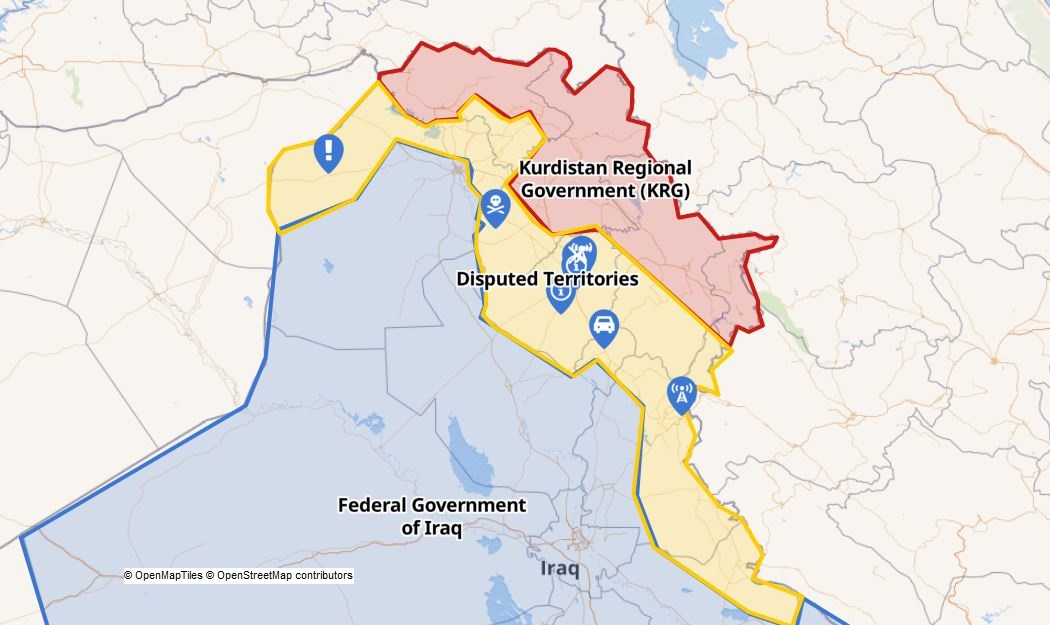1.9K
Kirkuk
- A lawmaker from the Arab Coalition, Mohaiman al Hamdani said, the current acting governor of Kirkuk, Rakan al Jabouri, will remain in his post, and his winning of parliamentary seat will be granted to Wasfi al Asie. Initially, al Jabouri attempted to send his brother. However, the Sunni leader, Khamis al Khanjar, mediated talks between the rival tribes of al Jabour and al Obaid and united the Arab position on this issue. Observers see the current agreement as a sign that Kirkuk’s governorship will be determined in the next provincial elections. On October 16th, 2017, the federal government imposed al-Jabouri on the Kurdish majority Kirkuk.
- Since Friday, February 4th, Iraqi security forces, including elements of the Army, have deployed in the city of Kirkuk, setting up several new checkpoints. Before the deployment of troops, a high-level security meeting in Kirkuk was held, warning of ISIS (Da’esh) retaliation for the recent death of its leader Abu Ibrahim al-Hashimi al-Qurashi. Further, an Iranian-backed militia leader in Kirkuk said they obtained “intelligence information” about Da’esh terrorists planning attacks on Kirkuk’s airport and the central prison. Meanwhile, the Iraqi interior ministry announced the arrest of two Da’esh terrorists in Kirkuk city and the Hawija district. Simultaneously, Kirkuk police announced the arrest of yet another drug dealer at his home in Baroutkhana. Dozens of drug dealers have been arrested or killed by the security forces as Kirkuk became the main route for drug trafficking since October 16th, 2017.
- The constant lack of basic service in Kirkuk led a local comedian to file a lawsuit against the acting governor, al Jabouri. Zaniar Juma told the press that since al Jabouri took office, “electricity, water, and waste pick up have vanished.” The lawsuit coincides with daily protests in Kirkuk over the shortage of services. Separately, the Integrity Commission said it detained the investor and the project manager of “weigh stations” of truckers for charging twice as the allowed amount.
- The Iraqi Planning Ministry ranked Kirkuk as having the third most illegal buildings on government land, consisting mainly of homes and stores. The ministry said 60,000 units had been built illegally in Kirkuk, ranking third in the country after Baghdad with 92,000 and Nasiriyah with 67,000.
Khanaqin
- Locals held a demonstration in front of the mayor’s office, demanding the removal of the director of the Diyala Distribution of Petroleum Products. The protests were triggered after a continued shortage of kerosene and gas. On the security front, Iraqi warplanes struck three areas near Khanaqin after “detection of Da’esh movement.”
Tuz Khurmatu
- Locals in Tuz Khurmatu are frustrated by an empty pledge by the Saladin administration to repair the main highway connecting Kirkuk and Baghdad, which runs through the town. On social media, activists complained about the decision to repair the road in 2020, but the deteriorated highway remains the same two years later.
Makhmour
- On Monday, February 7th, the Peshmerga concluded a joint operation with Iraqi forces in the Sargaran District of the “Disputed Territories.” The Ministry of Peshmerga Affairs claimed the operation was a success and said both sides worked together to search and clear the area of ISIS (Da’esh). On January 30th, the two sides held a meeting on a high level in Chamchamal district, vowing more cooperation in the disputed territories. Moreover, Iraqi jets bombarded Da’esh positions near the Qara Chokh mountain in Makhmour on Tuesday. The mountain has been considered the headquarters of Da’esh since October 16th, 2017.
Shingal (Sinjar)
- The situation in Shingal remains unstable after massive Turkish airstrikes two weeks ago, targeting the Sinjar Resistance Units (YBS). According to unconfirmed reports by pro-YBS activists, the Turkish airstrikes on Shingal were coordinated with Iraqi forces, incredibly since the latter pressured the YBS to release two people who were accused of “spying for Turkey.”

